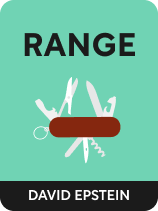

This article is an excerpt from the Shortform book guide to "Range" by David J. Epstein. Shortform has the world's best summaries and analyses of books you should be reading.
Like this article? Sign up for a free trial here .
Why does David Epstein think that Angela Duckworth’s book Grit is wrong? What are his issues with the “Grit Scale”?
In his book Range, David Epstein gives Grit criticism for lumping together persistence and commitment. He goes further to say that too much commitment can actually be harmful rather than helpful.
Here is how Grit gets it wrong, according to Epstein.
How Grit Gets It Wrong
Often, we see pivoting as a sign of weakness, giving up on what we’ve promised to do—a deficiency of “grit.” Epstein disagrees, arguing that “grit” is a deeply flawed way to measure human potential.
Popularized in Angela Duckworth’s 2016 book Grit, “grit” refers to the personality trait needed to set impressive goals and achieve them.
Epstein’s Grit criticism is that it lumps together persistence and commitment—two concepts that are similar, but not synonymous. While it’s beneficial to be as persistent as possible—to not be discouraged by struggles and setbacks—it’s not necessarily in your best interest to deeply commit to everything you’re doing. Duckworth’s “Grit Scale” test conflates persistence and commitment by assessing how much subjects agree with statements like “I often set a goal but later choose to pursue a different one” and “My interests change from year to year.”
While Duckworth is right to value commitment—after all, if you can’t commit to anything, you’ll never get anything done—she overlooks the fact that too much commitment can be just as harmful. Epstein cites a Gallup survey showing that 85% of workers around the world are either “not engaged” at work or “actively disengaged.” This shows that many people are far too committed to the jobs they currently have—if you’re actively apathetic about what you do eight hours a day, avoiding a job change not only hurts you, but it also the people who count on you at work.
Epstein argues that if a specific pursuit isn’t a good fit for you, sticking it out in the name of grit is the worst thing you can do. He points out that making a big, risky life change often takes more courage than doing nothing and continuing to plug away at whatever is in front of you.
| The Dip: How to Know When to Quit Epstein directly cites Seth Godin’s The Dip in this section—a book all about how grit is overrated. Many people conflate two very different types of quitting: quitting because you want to refocus on something new (the good kind of quitting, as Epstein describes), and quitting because you’re in “the Dip.” “The Dip” is the long span of time between being a beginner at something and being the best at something that’s difficult and less fun. However, because it weeds out the vast majority of people who try to do something, pushing through the Dip ensures that you are a scarce resource, and therefore, are valuable. To Godin, it’s possible for anyone to become the best in the world at something if they stick at it long enough and push through the Dip. By his definition, “the world” might be a single country, a niche software market, or just a small town. Being the “best in the world” just means that everyone in your “world” wants you. Only then do you receive a disproportionate share of rewards. Being the best in the world at something is a very attainable goal. You’ll often need to quit certain things to get there. But if you quit trying to be the best in the world, you’ll get stuck in a dead-end, and any more hard work you put in will give little in return. |

———End of Preview———
Like what you just read? Read the rest of the world's best book summary and analysis of David J. Epstein's "Range" at Shortform .
Here's what you'll find in our full Range summary :
- Why it's better to be proficient in a range of skills rather than becoming a specialist in one
- Why you're never “too late” to pursue something you’re interested in
- Why the nontraditional background of a generalist gives them an edge






